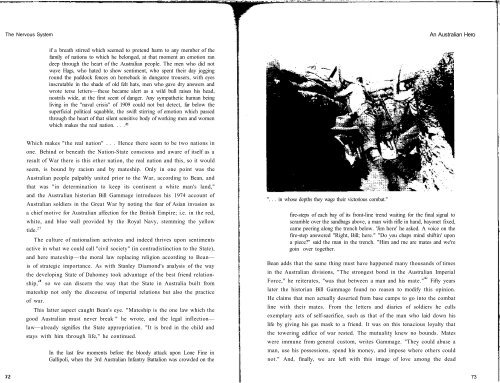The Nervous System - Department of English and Comparative ...
The Nervous System - Department of English and Comparative ...
The Nervous System - Department of English and Comparative ...
Create successful ePaper yourself
Turn your PDF publications into a flip-book with our unique Google optimized e-Paper software.
<strong>The</strong> <strong>Nervous</strong> <strong>System</strong><br />
An Australian Hero<br />
if a breath stirred which seemed to pretend harm to any member <strong>of</strong> the<br />
family <strong>of</strong> nations to which he belonged, at that moment an emotion ran<br />
deep through the heart <strong>of</strong> the Australian people. <strong>The</strong> men who did not<br />
wave Hags, who hated to show sentiment, who spent their day jogging<br />
round the paddock fences on horseback in dungaree trousers, with eyes<br />
inscrutable in the shade <strong>of</strong> old felt hats, men who gave dry answers <strong>and</strong><br />
wrote terse letters—these became alert as a wild bull raises his head,<br />
nostrils wide, at the first scent <strong>of</strong> danger. Any sympathetic human being<br />
living in the "naval crisis" <strong>of</strong> 1909 could not but detect, far below the<br />
superficial political squabble, the swift stirring <strong>of</strong> emotion which passed<br />
through the heart <strong>of</strong> that silent sensitive body <strong>of</strong> working men <strong>and</strong> women<br />
which makes the real nation. . . .<br />
Which makes "the real nation" . . . Hence there seem to be two nations in<br />
one. Behind or beneath the Nation-State conscious <strong>and</strong> aware <strong>of</strong> itself as a<br />
result <strong>of</strong> War there is this other nation, the real nation <strong>and</strong> this, so it would<br />
seem, is bound by racism <strong>and</strong> by mateship. Only in one point was the<br />
Australian people palpably united prior to the War, according to Bean, <strong>and</strong><br />
that was "in determination to keep its continent a white man's l<strong>and</strong>,"<br />
<strong>and</strong> the Australian historian Bill Gammage introduces his 1974 account <strong>of</strong><br />
Australian soldiers in the Great War by noting the fear <strong>of</strong> Asian invasion as<br />
a chief motive for Australian affection for the British Empire; i.e. in the red,<br />
white, <strong>and</strong> blue wall provided by the Royal Navy, stemming the yellow<br />
tide. 27<br />
<strong>The</strong> culture <strong>of</strong> nationalism activates <strong>and</strong> indeed thrives upon sentiments<br />
active in what we could call "civil society" (in contradistinction to the State),<br />
<strong>and</strong> here mateship—the moral law replacing religion according to Bean—<br />
is <strong>of</strong> strategic importance. As with Stanley Diamond's analysis <strong>of</strong> the way<br />
the developing State <strong>of</strong> Dahomey took advantage <strong>of</strong> the best friend relationship,<br />
so we can discern the way that the State in Australia built from<br />
mateship not only the discourse <strong>of</strong> imperial relations but also the practice<br />
<strong>of</strong> war.<br />
This latter aspect caught Bean's eye. "Mateship is the one law which the<br />
good Australian must never break " he wrote, <strong>and</strong> the legal inflection—<br />
law—already signifies the State appropriation. "It is bred in the child <strong>and</strong><br />
stays with him through life," he continued.<br />
In the last few moments before the bloody attack upon Lone Fine in<br />
Gallipoli, when the 3rd Australian Infantry Battalion was crowded on the<br />
". . . in whose depths they wage their victorious combat."<br />
fire-steps <strong>of</strong> each bay <strong>of</strong> its front-line trend waiting for the final signal to<br />
scramble over the s<strong>and</strong>bags above, a man with rifle in h<strong>and</strong>, bayonet fixed,<br />
came peering along the trench below. 'Jim here' he asked. A voice on the<br />
fire-step answered "Right, Bill; here." "Do vou chaps mind shirtin' upon<br />
a piece?" said the man in the trench. "Him <strong>and</strong> me are mates <strong>and</strong> we're<br />
goin over together.<br />
Bean adds that the same thing must have happened manv thous<strong>and</strong>s <strong>of</strong> times<br />
in the Australian divisions, "<strong>The</strong> strongest bond in the Australian Imperial<br />
Force," he reiterates, "was that between a man <strong>and</strong> his mate."<br />
Fifty years<br />
later the historian Bill Gammage found no reason to modify this opinion.<br />
He claims that men actually deserted from base camps to go into the combat<br />
line with their mates. From the letters <strong>and</strong> diaries <strong>of</strong> soldiers he culls<br />
exemplary acts <strong>of</strong> self-sacrifice, such as that <strong>of</strong> the man who laid down his<br />
life by giving his gas mask to a friend. It was on this tenacious loyalty that<br />
the towering edifice <strong>of</strong> war rested. <strong>The</strong> mutuality knew no bounds. Mates<br />
were immune from general custom, writes Gammage. "<strong>The</strong>y could abuse a<br />
man, use his possessions, spend his money, <strong>and</strong> impose where others could<br />
not." And, finally, we are left with this image <strong>of</strong> love among the dead<br />
73
















